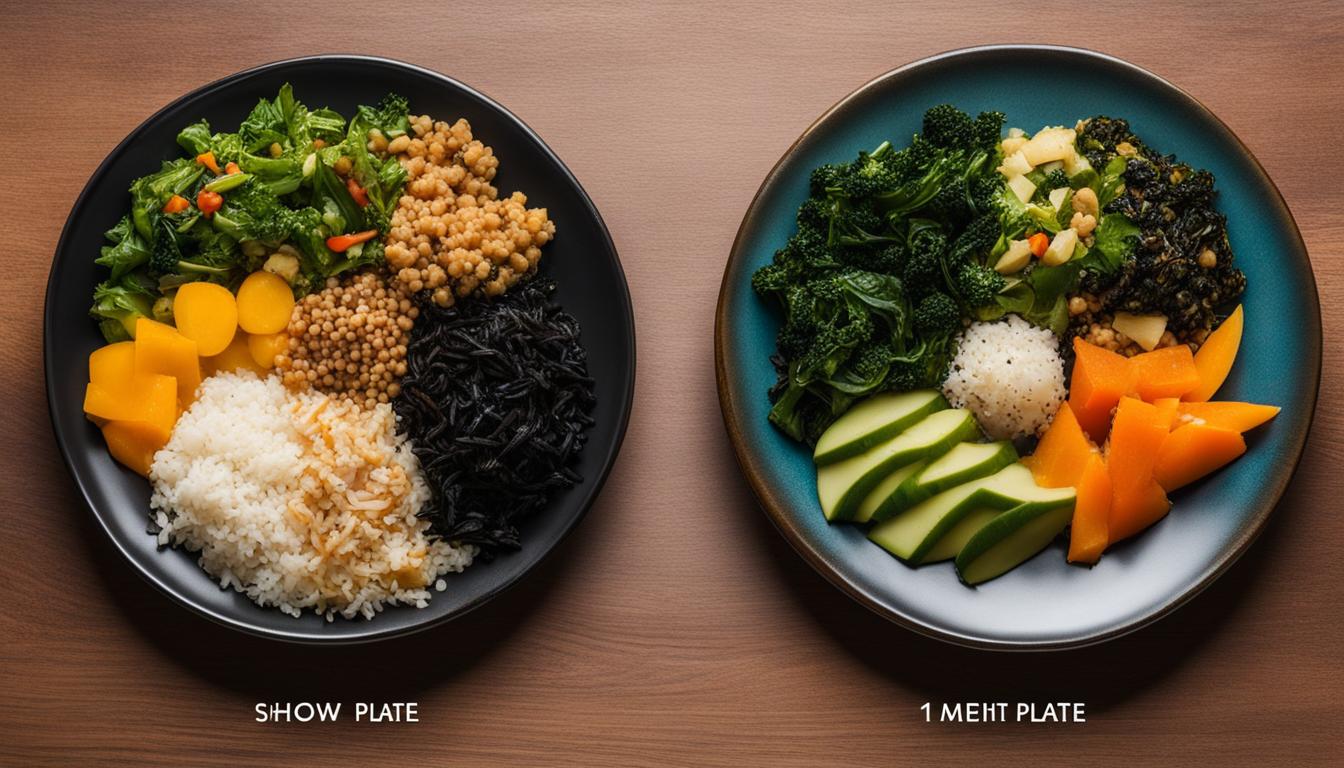When it comes to managing our weight, there are various approaches we can take. Two popular methods that often come up in discussions are the calorie-counting diet and the portion-control diet. While they may seem similar on the surface, there are key differences between these two approaches that can significantly impact our weight management efforts. In this article, we will explore these differences and help you understand which approach might be best suited for you.
Key Takeaways:
- A calorie-counting diet involves tracking the number of calories consumed, whereas a portion-control diet focuses on controlling the size of food portions.
- Calorie-counting diets prioritize the total caloric intake, while portion-control diets emphasize portion sizes.
- Calorie-counting diets offer flexibility in food choices but require meticulous tracking, while portion-control diets offer portion guidance but allow more flexibility in food selection.
- Both approaches can be effective for weight management, but individuals may find one method more sustainable and suitable for their lifestyle.
- Consulting with a healthcare professional or registered dietitian can help you determine which approach aligns best with your goals and needs.
The Importance of Diet Quality over Calorie Quantity
When it comes to achieving long-term weight loss and management, research suggests that diet quality is more important than calorie quantity. Calorie obsessing alone may not lead to sustainable results. Instead, focusing on the quality of the food we consume can have a significant impact on our overall health and weight.
A study published in JAMA found that individuals who prioritized whole foods and avoided processed foods, refined starches, and added sugars experienced substantial weight loss, regardless of the macronutrient distribution of their diet. This challenges the notion that different diets should be recommended based on genetic factors or insulin response.
By shifting the focus from calorie counting to promoting the consumption of nutrient-dense foods, health authorities can provide more effective guidance for weight management. This approach not only supports weight loss but also improves overall well-being. A diet rich in whole foods provides essential nutrients, boosts energy levels, and helps maintain a healthy weight in the long run.
The Impact of Processed Foods, Refined Starches, and Added Sugar
Processed foods, refined starches, and added sugars are commonly found in many modern diets. These foods are often high in calories, lacking in essential nutrients, and can contribute to weight gain and poor health outcomes. By avoiding these foods and focusing on whole, unprocessed options, individuals can improve their overall diet quality and support their weight management goals.
| Processed Foods | Refined Starches | Added Sugar |
|---|---|---|
| High in unhealthy fats and artificial ingredients | Low in fiber and essential nutrients | Empty calories with no nutritional value |
| Can lead to overeating and weight gain | Rapidly digested, causing blood sugar spikes | Can contribute to insulin resistance and metabolic disorders |
| Often linked to increased risk of chronic diseases | May lead to cravings and hunger due to blood sugar fluctuations | Can promote inflammation and negative health effects |
By making conscious choices to prioritize whole foods and reduce processed foods, refined starches, and added sugars, individuals can significantly improve their diet quality and support their weight management efforts. It’s important to remember that a balanced and nutrient-dense diet is key to long-term health and sustainable weight management.
The Role of Calorie Balance in Weight Management
Calorie balance is a fundamental factor in achieving weight loss or weight gain goals. To effectively lose weight, an individual needs to create a calorie deficit by consuming fewer calories than they burn in a day. On the other hand, to gain weight and build muscle, individuals need to create a calorie surplus by consuming more calories than they burn. While other factors such as protein intake and exercise can influence calorie balance, the overall energy balance remains the primary determinant of weight loss or weight gain.
Understanding calorie balance is key to developing a successful weight management strategy. By tracking calorie intake and expenditure, individuals can adjust their diet and exercise routines to achieve their desired goals. For weight loss, creating a moderate calorie deficit of approximately 500-1000 calories per day can result in a gradual and sustainable loss of 1-2 pounds per week. Conversely, for weight gain, a calorie surplus of 250-500 calories per day can support muscle growth and gradual weight gain without excessive fat accumulation.
It’s important to note that calorie balance alone does not guarantee optimal health or body composition. While achieving a calorie deficit or surplus is necessary for weight management, the quality of calories consumed also plays a crucial role. A balanced diet rich in nutrient-dense whole foods, coupled with portion control, is essential for promoting overall health and sustainable weight management. Focusing solely on calorie counting without considering the nutritional value of foods can lead to nutrient deficiencies and inadequate fuel for the body’s needs.
| Calorie Balance | Weight Loss | Weight Gain |
|---|---|---|
| Calorie Deficit | Consume fewer calories than burned | N/A |
| Calorie Surplus | N/A | Consume more calories than burned |
Understanding and managing calorie balance is vital for individuals seeking to achieve their desired weight and maintain a healthy lifestyle. By combining calorie balance with a focus on nutrient-dense foods and portion control, individuals can optimize their weight management efforts and improve overall well-being.
The Relationship Between Calorie Counting and Healthy Habits
When it comes to achieving optimal health and weight management, calorie counting can be an effective tool. However, it is important to remember that health should always come first. Focusing on developing good eating habits and maintaining a balanced diet is essential for long-term success.
One of the key aspects of a healthy eating plan is incorporating whole foods into your diet. Whole foods, such as fruits, vegetables, lean proteins, and whole grains, are rich in nutrients and provide the body with essential vitamins, minerals, and antioxidants. They also tend to be lower in calories compared to processed foods, which are often high in added sugars, unhealthy fats, and sodium.
Portion control is another important factor to consider. While counting calories can help you stay within a certain range, it is equally important to be mindful of portion sizes. Using smaller plates, measuring food, and listening to your body’s hunger and fullness cues can all help you maintain a healthy balance of nutrients without obsessing over calories.
The Importance of Balanced Eating Habits
Developing balanced eating habits goes beyond just counting calories. It involves nourishing your body with a variety of foods from different food groups to ensure you are getting all the necessary nutrients. When planning your meals, aim to include a mix of carbohydrates, proteins, and healthy fats. This will provide you with sustained energy throughout the day and help you feel satisfied.
In addition to focusing on whole foods and portion control, it is also important to pay attention to the quality of the food you consume. Opting for nutrient-dense foods over processed or fast foods can greatly benefit your overall health and well-being. Nutrient-dense foods are rich in vitamins, minerals, and antioxidants, and they contribute to better digestion, improved immunity, and increased energy levels.
In summary, while calorie counting can be a useful strategy for managing weight, it should not overshadow the importance of developing good eating habits and maintaining a balanced diet. Prioritizing whole foods, portion control, and overall health will not only help you reach your weight goals but also promote a sustainable and enjoyable lifestyle.
| Benefits of Healthy Habits | Drawbacks of Strict Calorie Counting |
|---|---|
|
|
How to Determine Caloric Needs
Calculating caloric needs is an essential step in managing weight and achieving fitness goals. Understanding the basal metabolic rate (BMR) and the activity factor is crucial for determining the total number of calories needed to maintain weight. By calculating these factors, individuals can then adjust their calorie intake to create a calorie deficit for weight loss or a calorie surplus for weight gain.
The BMR represents the number of calories the body burns at rest. It can be estimated using formulas that take into account factors such as age, height, weight, and gender. Online BMR calculators are available to simplify the process. Once the BMR is determined, it is then multiplied by the activity factor, which represents the level of physical activity.
To create a calorie deficit for weight loss, individuals can reduce their calorie intake below their calculated needs. It is generally recommended to aim for a deficit of around 500-1000 calories per day to achieve a gradual and sustainable weight loss of 1-2 pounds per week. Conversely, for weight gain, individuals can increase their calorie intake above their calculated needs to create a calorie surplus and promote muscle growth.
Caloric Needs Calculation Example:
| Factor | Value |
|---|---|
| BMR | 1500 calories |
| Activity Factor | 1.5 (moderate activity level) |
| Total Calories Needed per Day | 2250 calories (BMR x Activity Factor) |
| Calorie Deficit for Weight Loss | 1750-2000 calories (Total Calories – Deficit) |
| Calorie Surplus for Weight Gain | 2500-3000 calories (Total Calories + Surplus) |
It’s important to note that these calculations provide a general starting point, and individual needs may vary based on factors such as age, muscle mass, and metabolism. Consulting with a registered dietitian or healthcare professional can help fine-tune caloric needs and create a personalized plan.
By understanding and calculating caloric needs, individuals can better navigate their weight management journey. Whether the goal is weight loss or weight gain, maintaining a calorie deficit or surplus is key. Remember to approach these calculations as a tool, and combine them with a balanced diet and regular physical activity for optimal results.
The Role of Protein in Calorie Counting and Portion Control
Protein intake plays a crucial role in both calorie counting and portion control when it comes to achieving weight loss goals. Including an adequate amount of protein in your diet can have several benefits for satiety and overall weight loss.
When practicing calorie counting, prioritizing protein can help you feel fuller for longer periods. This increased satiety can prevent overeating and help you stick to your calorie goal. Additionally, protein has a higher thermic effect compared to carbohydrates and fats, meaning that your body burns more calories during the digestion and absorption process of protein-rich foods.
Similarly, portion control can be enhanced by focusing on protein-rich foods. Including a lean source of protein, such as chicken breast or tofu, in each meal can contribute to feelings of fullness and satisfaction. This, in turn, can help you maintain appropriate portion sizes and prevent overeating.
Overall, prioritizing protein intake is essential for both calorie counting and portion control. It promotes feelings of satiety, contributes to a balanced diet, and supports weight loss efforts. Incorporating protein-rich foods into your meals can help you achieve your weight-related goals and maintain a healthy lifestyle.
The Pros and Cons of Calorie Counting
Calorie counting is a widely practiced method for weight loss and management. It offers several benefits that can help individuals achieve their goals effectively. However, it also comes with some drawbacks that can impact its sustainability and effectiveness.
Pros of Calorie Counting
1. Accuracy: One of the main advantages of calorie counting is its accuracy in tracking calorie intake. By diligently recording and monitoring the number of calories consumed, individuals can have a precise understanding of their energy intake, which can be useful for creating a specific calorie deficit for weight loss or a calorie surplus for weight gain.
2. Targeted Weight Loss: Calorie counting allows individuals to set specific weight loss goals and tailor their calorie intake accordingly. This method enables a more targeted approach to weight loss, as individuals can adjust their calorie intake to meet their desired rate of weight loss.
3. Macronutrient Distribution: Calorie counting provides insight into the distribution of macronutrients in one’s diet. By tracking the number of calories derived from carbohydrates, proteins, and fats, individuals can optimize their macronutrient intake according to their specific needs and goals.
Cons of Calorie Counting
1. Time-consuming and Tedious: Calorie counting requires time and effort. It involves meticulously tracking and recording every single calorie consumed, which can become tedious and lead to a sense of obsession around food. This level of detail can be overwhelming and may deter individuals from adhering to a calorie counting approach in the long term.
2. Potential for Obsessive Behavior: Calorie counting has the potential to fuel obsessive behavior around food. Constantly measuring and quantifying every calorie can create a negative relationship with food and impact one’s overall well-being and mental health. It is important to approach calorie counting with a balanced mindset and prioritize overall health and well-being.
3. Sustainability: While calorie counting can be effective for short-term weight loss goals, it may not be sustainable as a long-term lifestyle. The meticulous tracking and constant focus on numbers can become exhausting and lead to burnout. Adopting healthier eating habits and focusing on the quality of food consumed rather than solely counting calories can promote a more sustainable approach to weight management.

In conclusion, calorie counting has its pros and cons. It offers accuracy in tracking calorie intake, allows for targeted weight loss goals, and provides insight into macronutrient distribution. However, it can be time-consuming, potentially fuel obsessive behavior, and may not be sustainable in the long term. It is important to find a balanced approach to weight management that prioritizes overall health, incorporates healthy eating habits, and considers the quality of food consumed.
Conclusion
In conclusion, effective weight management involves more than just counting calories or controlling portion sizes. It requires a holistic approach that prioritizes healthy eating, maintains calorie balance, and promotes a sustainable lifestyle.
Instead of obsessing over calorie numbers, individuals should focus on making nutritious food choices that support overall well-being. This means opting for whole foods, cooking meals from scratch, and practicing portion control.
Developing good eating habits and incorporating these habits into daily routines is key to long-term success. By adopting a sustainable lifestyle centered around healthy eating and regular physical activity, individuals can achieve their weight management goals and enjoy improved overall health and well-being.
Remember, weight management is not just about the numbers on the scale. It’s about cultivating healthy habits that support a balanced and fulfilling life.
FAQ
Is a calorie-counting diet the same as a portion-control diet?
No, there are differences between calorie-counting and portion-control diets.
What is the key to long-term weight loss and management?
Research suggests that diet quality, not calorie quantity, is the key to long-term weight loss and management.
Do calories matter for changing body composition?
Yes, calories do matter for changing body composition. Creating a calorie deficit or surplus is crucial for weight loss or weight gain.
What should be prioritized for overall health?
Overall health should be prioritized by developing good eating habits, focusing on a balanced diet that includes whole foods and practicing portion control.
How can I determine my caloric needs?
To determine your caloric needs, calculate your basal metabolic rate, which is the number of calories burned at rest, and adjust it based on your activity factor.
What is the role of protein in calorie counting and portion control?
Increasing protein intake can promote satiety, weight loss, and muscle maintenance, whether you are counting calories or practicing portion control.
What are the pros and cons of calorie counting?
Calorie counting can provide accuracy in tracking calorie intake and help create a specific calorie deficit or surplus. However, it can be time-consuming and may lead to obsessive behavior around food.
 Skip to main content
Skip to main content


